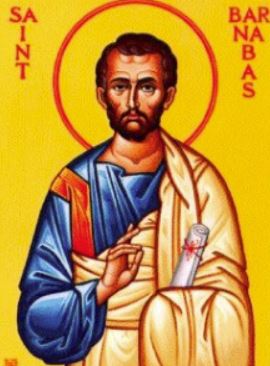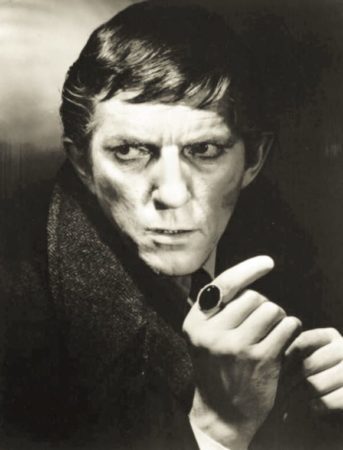
St. Barnabas

‘Barnabas’ from Dark Shadows
Pretty sure that the first time I heard the name “Barnabas,” it wasn’t from the pages of Scripture.
When I reach back into my memory – deep into the pockets of my brain – I can see myself as a young boy, sitting on my mom’s lap watching soap operas on our black-and-white TV.
And there was this soap opera she and I really liked (as much as a 5-year-old could) because it was unlike any other. Dark Shadows (ABC 1966-71) was a spooky drama whose main character (Barnabas Collins) was a vampire always on the hunt for new blood.
The actor that played Barnabas, Canadian-born Jonathan Frid, really looked the part – a creepy, late-60s version of Bela Lugosi. More on that Barnabas later.
Today, the Church honors her own Barnabas – St. Barnabas, who is recalled as one of the first of the Christian faithful at Jerusalem and a companion of St. Paul, although not quite as well known.
One of the things I really love about the Catholic Church is how with our Liturgical Calendar, we honor and keep alive the memories of so many men and women, especially those who are not prominent role players in the (recorded) history of our faith.
Clearly, we all know about Paul. In terms of notoriety, he ranks right up there with Peter, James, John … Matthew, Mark and Luke.
Barnabas? Not so much … not quite as well-known. In fact, after he split with Paul, we lost track of his journeys – although we believe he continued to spread the Gospel.
St. Barnabas, who was well-known as a prophet or teacher in Antioch, played a key role in Paul’s ministry when he persuaded the Jerusalem community to accept Paul as a disciple. Later, he would also play a role in the Peter vs. Paul debate regarding the need to observe Jewish rites.
Together, Paul and Barnabas traveled to Cyprus, Perga, Antioch (Psidia) and Lycaonia, spreading the Good News and helping to form the first Christian communities.
One could argue that Barnabas played just as important a role in the spread of this “new religion” as Paul, but Paul gets more of the “glory” because his letters to various communities are included as part of the New Testament. Not that either of these holy men wanted any glory …
There is an Epistle of Barnabas (easily found online) that seemingly captures the essence of many of St. Barnabas’ teachings of the times, but the authorship is unclear, which may have been why it was not included in the New Testament when the Church put together its Canon of Scripture.
And yet, the Church continues to honor Barnabas – and many, many others whose letters and stories never made it into the pages of Scripture. Indeed, the history of our salvation far surpasses the pages of the Bible.
That’s the point of this reflection.
Days like today are reminders that we don’t have to be Biblical writers, priests and prophets, prolific preachers in order to play a vital role in salvation history. The support we give to others, the travels that we take and – most importantly – the witness we give with our good deeds to others, are all noticed by God, even if others may not be aware.
And it is God who we should seek to please … not others and certainly not ourselves.
Back to that other Barnabas, the vampire.
Dark Shadows had a nice run of popularity, but by 1971 the show was cancelled, leaving Jonathan Frid with a challenge of rebuilding his career in another way. (Interesting to note that at one point, he won the role of Thomas Becket in the Broadway production of Murder in the Cathedral).
After several roles in a variety of other productions, the actor never forgot fans of Dark Shadows, popping up at “fan conventions” whenever possible. He died in 2012 at the age of 87; and while Jonathan Frid does not have a special day on the church calendar, his legacy lives on through vintage videos that are still popular for some fans of his portrayal of Barnabas.
This is the new way remembering those do good (or bad).
By the way, there is at least one common trait between the Barnabas of the First Century and the vampire of Dark Shadows.
Both were on missions for new blood, so to speak.
One of them to satisfy his own “hunger” with a bite on the neck; and the other to satisfy the hunger God has for conversions of heart.
Pray today that like St. Barnabas and his role with St. Paul, we can accept the role God has for us to help bring about the Kingdom of Heaven here on earth – no matter where that calling leads.
